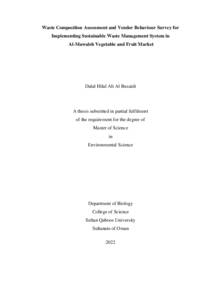Document
Waste composition assessment and vendor behaviour survey for implementing sustainable waste management system in Al-Mawaleh Vegetable and Fruit Market.
Other titles
تقييم تركيبة النفايات ومسح سلوك البائعين لتطبيق نظام إدارة النفايات المستدامة في سوق الموالح للخضار الفواكه
Publisher
Sultan Qaboos University.
Gregorian
2022
Language
English
Subject
English abstract
Al-Mawaleh market is a regional wholesale vegetable and fruit market that supplies
fruit and vegetable to all governorates of Oman in which waste generation from the
wholesale shops is around 700 tons per month. The collection and disposal of such
wastes need greater planning and regular adjustments from the city's waste managing
authority. Baseline data on solid waste (SW) generation rate and composition
characteristics are vital for any proper waste management to reduce environmental
impacts. The awareness of the vendors on waste generation and general behaviour to
comply with the basic disposal procedures set by the local authorities within the market
premises are crucial for the success of the program.
The sampling was carried out in four periods; Summer, Winter, Ramadan and Eid
festivals. In a day, sampling was carried out twice, once in the afternoon and the
evening. A total of 2160 SW samples were obtained from forty-five shops. The study
found that organic waste mostly fruit waste accounted the highest (39.20%) SW
fractions, followed by vegetables (31.49%) and plastics (12.83%). Cartons (7.65%)
and woods (8.85%) waste were the lowest due to their reuse potential by majority of
the market vendors. The generation of SW was found to be high and fluctuated
between seasons (winter, summer) and occasions with high production during
Ramadan period. This variation is statistically verified and may be attributed to nature
of demand and supply, consumption pattern with seasons and special events, etc.
Proximate analysis of the organic wastes are characterized by high mineralogical and
elemental compositions. Their high moisture content (84.47%) could lead to the
production of potent greenhouses gases such as CO2 and CH4 at landfill sites if
sustainable energy recovery technologies are not employed. The major (70 percent)
decomposable organic waste (fruits and vegetables waste) from the market is a
potential source of feedstock for energy production. If the waste management
strategies such as composting, recycling and energy recovery are exercised, there will
be reduction in SW currently getting disposed to the landfill.
In addition, a total of 60 shops were selected based on the minimum sampling size for
vendor survey and from all shops a total of 120 respondents participated in the study.
The survey study found that majority of vendors have limited awareness on sustainable
SW management practices. This inturn creates segregation and 3Rs management
challenges. However, most of the vendors support the idea of managing solid waste in
the market (95%). The survey work also revealed that any intervention to create
awareness, education and training to improve Solid Waste Management System
(SWMS) in the market needs to consider demographic, education levels of the vendors
in the market and also identify proper channels of communication. Currently, the
absence of waste segregation in the market makes any recycling attempt difficult to
practice and may become a constraint in future recycling plans. The data presented in
this study from Al-Mawaleh market can serve as a baseline and provide useful
guidance for future national-scale SW accounting by covering all potential wholesale
markets in Oman.
Member of
Resource URL
Arabic abstract
سوق الموالح هو سوق إقليمي لبيع الخضار والفاكهة بالجملة، يوفر الفاكهة والخضروات لجميع محافظات عمان، حيث يبلغ إنتاج النفايات من محلات البيع بالجملة حوالي 700 طن شهريًا. يحتاج جمع هذه النفايات والتخلص منها إلى مزيد من التخطيط، والتعديلات المنتظمة من سلطة إدارة النفايات في المدينة. تعد البيانات الأساسية حول معدل توليد النفايات الصلبة وخصائص التركيب الحيوية مهمة لإدارة النفايات لتقليل الآثار البيئية. إن وعي البائعين بشأن توليد النفايات والسلوك العام للامتثال لإجراءات التخلص الأساسية التي وضعتها السلطات المحلية داخل مباني السوق أمر بالغ الأهمية لنجاح البرنامج. أجريت العينات في أربع فترات؛ الصيف، والشتاء، ورمضان، والعيد. في يوم واحد، تم أخذ العينات مرتين، مرة بعد الظهر ومرة مساء. تم الحصول على إجمالي 2160 عينة من النفايات الصلبة من 45 محال.ً ووجدت الدراسة أن النفايات العضوية في الغالب نفايات الفاكهة تمثل أعلى نسبة )٪39.20( من مكونات النفايات، تليها الخضروات )٪31.49(، والبلاستيك )٪12.83(. كانت نفايات الكرتون )٪7.65( والأخشاب )٪8.85( هي الاقل بسبب إمكانية إعادة استخدامها من قبل غالبية بائعي السوق. وجد أن توليد النفايات الصلبة مرتفع ومتقلب بين المواسم )الشتاء والصيف(، والمناسبات ذات الانتاج العالي خلال شهر رمضان. تم التحقق من هذا الاختالف إحصائيًا وقد يُعزى إلى طبيعة العرض والطلب ونمط الاستهالك مع المواسم والمناسبات الخاصة، إلخ. يتميز التحليل التقريبي للنفايات العضوية بتركيبات معدنية وعناصر عالية. يمكن أن يؤدي محتواها العالي من الرطوبة )٪84.47( إلى إنتاج غازات دفيئة قوية مثل ثاني أكسيد الكربون والميثان في مواقع دفن النفايات، إذا لم يتم استخدام تقنيات استعادة الطاقة المستدامة. تعد النفايات العضوية القابلة للتحلل )%70( )نفايات الفواكه للمواد الاولية إلنتاج الطاقة. إذا تم ممارسة إستراتيجيات إدارة النفايات والخضروات( في السوق مصد ًرا محتملا مثل التسميد، وإعادة التدوير، واستعادة الطاقة، فسيكون هناك انخفاض في معدل النفايات الصلبة التي يتم التخلص منها حاليًا في مكب النفايات. تم اختيار مجموعة 60 محًال بنا ًء على الحد الادنى لحجم العينة لمسح البائعين، وشارك في الدراسة 120 شخصا من كل المحلات. وجدت الدراسة الاستقصائية أن غالبية البائعين لديهم وعي محدود بممارسات إدارة النفايات الصلبة المستدامة. هذا يخلق تحديات فصل وإدارة النفايات. ومع ذلك، فإ ن معظم البائعين يؤيدون فكرة إدارة النفايات الصلبة في السوق )٪95(. كشفت أعمال المسح أيضا أن أي تدخل لنشر الوعي، والتعليم، والتدريب لتحسين نظام إدارة النفايات الصلبة في السوق يحتاج إلى مراعاة المستويات الديموغرافية والتعليمية للبائعين في السوق وأي ًضا تحديد قنوات الاتصال المناسبة. في الوقت الحالي، يؤدي عدم وجود فصل للنفايات في السوق إلى صعوبة ممارسة أي محاولة إلعادة التدوير، وقد تصبح قيدًا في خطط إعادة التدوير المستقبلية. يمكن أن تكون البيانات المقدمة في هذه الدراسة من سوق الموالح بمنزلة خط أساس توفر إرشادات مفيدة للأخذ في الاعتبار النفايات الصلبة على المستوى الوطني في المستقبل من خلال تغطية جميع أسواق الجملة في عمان.
Category
Theses and Dissertations

